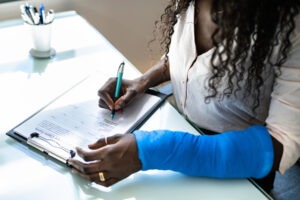
Nobody wants to suffer a personal injury in an accident, but sometimes, people’s negligent actions result in someone else getting hurt. In the aftermath of a personal injury accident, you should focus on your safety and medical needs before documenting the scene and gathering evidence to support a personal injury claim.
An attorney from our law firm can handle your personal injury claim while you take the time to recover from your injuries.
What Should You Do After a Personal Injury Accident?
We all react differently to suffering an injury in an accident. Emotions usually run high, and it’s difficult to focus or think. But it’s important to try to remain calm and take steps to keep yourself safe and document the accident and your injuries as much as possible, so you can present a strong claim to the negligent party’s insurance provider or in court if necessary.
Contact Us For A Free Legal Consultation. No Fee.
Call (833) 55-FIGHTGet Yourself to Safety
The first step to take after an accident is to find a safe place to go, especially after a car accident. Take time to assess if you have injuries and how serious they are before you attempt to move. Some injuries may not present symptoms right away. If you can move your vehicle off the road, do so carefully.
You should also call the police and EMTs to come to the scene to provide assistance. Avoid moving as much as possible to prevent additional injury if possible.
Seek Medical Treatment
Your main priority after an accident is your well-being. That means seeking immediate medical attention. Accidents can result in serious injuries, including spinal, neck, and head injuries. You could also have puncture wounds, internal bleeding, and broken bones.
You may be reluctant to seek treatment if your injuries seem minor, but we urge you to consent to an examination by first responders at the scene and go to the hospital if they recommend that you do so.
If you don’t go to the hospital, you should follow up with your physician for a complete check-up. You could have injuries that an EMT doesn’t have the equipment or expertise to detect. Documenting your injuries and treatment will also help when you file a personal injury claim.
Gather Information
Your doctor can evaluate and document your injuries and treatment, but there is information that you can gather on your own at the accident scene if you are able.
First, collect names, contact information, and insurance providers of all other involved parties. Be careful what you say. Don’t admit fault or excuse their actions. The insurance company could use your words against you to deny your claim.
Take photographs or videos of the accident scene, including the damage to your vehicle and your visible injuries, if any. Ask the responding police officers to make a report and request a copy. The police report is valuable in the assignment of liability. Write down the officers’ names and badge numbers for future reference. You should also speak to witnesses and collect their names and contact information.
Record Your Story
As time passes after an accident, memories can fade quickly. Writing down your narrative soon after the accident can help preserve your testimony. Keep a journal and record your perspective from that day. Include as many details as you can recall.
You can also use your journal to document how the accident and your injuries have affected you. Are you in constant pain? Do you have nightmares or trauma? Did you have to spend time away from work? How is your lost income affecting you and your family?
Your journal is a personal piece of evidence that can strengthen your claim.
Consider Hiring an Attorney
We encourage personal injury accident victims to obtain legal representation as soon as possible after an incident. A legal professional can evaluate your case during a free consultation and guide you through the claims and legal processes.
Your personal injury attorney can protect your rights, including by meeting the statute of limitations in your case, so you don’t lose your right to file a lawsuit. In California, this deadline is two years from the accident, per CCP § 335.1. That may sound like a long time, but building a solid personal injury case requires as much time as possible.
An attorney also levels the playing field, since the liable party and their insurance provider will likely have robust legal representation.
Be Careful Who You Talk to and What You Say
Avoid speaking about your case to others. Only you, your doctor, and your attorney should be in the loop. Be sure to have your attorney by your side when speaking to the liable party’s lawyer or insurance provider.
Avoid posting on social media while your case is active. You should even tell family and friends little, if anything, about your case.
Learn More About What to Do After a Personal Injury Accident Today
You don’t have to go through the aftermath of a personal injury accident alone. A personal injury lawyer from Greenberg Gross can handle your case and help you get through the process.
If you want to learn more about what to do after a personal injury accident or schedule a free consultation, contact our law firm today.
Experienced Attorneys Who Will Listen And Fight For You
Speak To An Attorney Now »